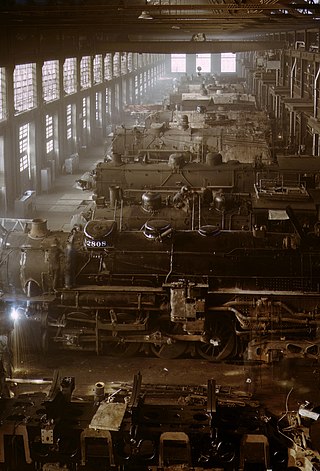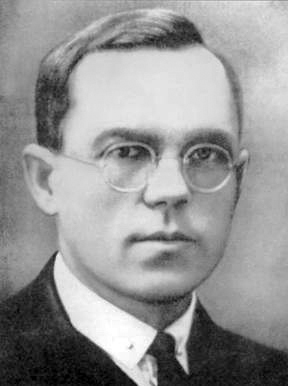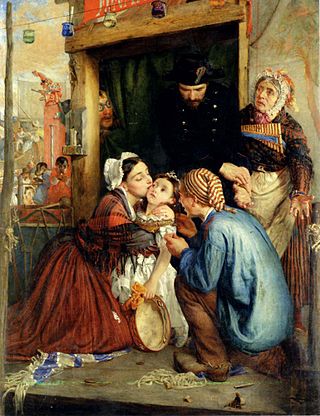
A civilization is any complex society characterized by the development of the state, social stratification, urbanization, and symbolic systems of communication beyond natural spoken language.

The Industrial Revolution, also known as the First Industrial Revolution, was a period of global transition of the human economy towards more widespread, efficient and stable manufacturing processes that succeeded the Agricultural Revolution, starting from Great Britain and spreading to continental Europe and the United States, that occurred during the period from around 1760 to about 1820–1840. This transition included going from hand production methods to machines; new chemical manufacturing and iron production processes; the increasing use of water power and steam power; the development of machine tools; and the rise of the mechanized factory system. Output greatly increased, and the result was an unprecedented rise in population and the rate of population growth. The textile industry was the first to use modern production methods, and textiles became the dominant industry in terms of employment, value of output, and capital invested.

A peasant is a pre-industrial agricultural laborer or a farmer with limited land-ownership, especially one living in the Middle Ages under feudalism and paying rent, tax, fees, or services to a landlord. In Europe, three classes of peasants existed: non-free slaves, semi-free serfs, and free tenants. Peasants might hold title to land outright, or by any of several forms of land tenure, among them socage, quit-rent, leasehold, and copyhold.

Nomads are communities without fixed habitation who regularly move to and from areas. Such groups include hunter-gatherers, pastoral nomads, tinkers and trader nomads. In the twentieth century, the population of nomadic pastoral tribes slowly decreased, reaching an estimated 30–40 million nomads in the world as of 1995.

A traditional hunter-gatherer or forager is a human living an ancestrally derived way of life in which most or all food is obtained by foraging, that is, by gathering food from local naturally occurring sources, especially edible wild plants but also insects, fungi, honey, bird eggs, or anything safe to eat, and/or by hunting game. This is a common practice among most vertebrates that are omnivores. Hunter-gatherer societies stand in contrast to the more sedentary agricultural societies, which rely mainly on cultivating crops and raising domesticated animals for food production, although the boundaries between the two ways of living are not completely distinct.

Industrialisation (UK) or industrialization (US) is the period of social and economic change that transforms a human group from an agrarian society into an industrial society. This involves an extensive reorganisation of an economy for the purpose of manufacturing. Industrialisation is associated with increase of polluting industries heavily dependent on fossil fuels. With the increasing focus on sustainable development and green industrial policy practices, industrialisation increasingly includes technological leapfrogging, with direct investment in more advanced, cleaner technologies.

In sociology, an industrial society is a society driven by the use of technology and machinery to enable mass production, supporting a large population with a high capacity for division of labour. Such a structure developed in the Western world in the period of time following the Industrial Revolution, and replaced the agrarian societies of the pre-modern, pre-industrial age. Industrial societies are generally mass societies, and may be succeeded by an information society. They are often contrasted with traditional societies.

Nikolai Dmitriyevich Kondratiev was a Russian Soviet economist and proponent of the New Economic Policy (NEP) best known for the business cycle theory known as Kondratiev waves.
The Rostovian take-off model is one of the major historical models of economic growth. It was developed by W. W. Rostow. The model postulates that economic modernization occurs in five basic stages, of varying length.
- Traditional society
- Preconditions for take-off
- Take-off
- Drive to maturity
- Age of High mass consumption

An agrarian society, or agricultural society, is any community whose economy is based on producing and maintaining crops and farmland. Another way to define an agrarian society is by seeing how much of a nation's total production is in agriculture. In agrarian society, cultivating the land is the primary source of wealth. Such a society may acknowledge other means of livelihood and work habits but stresses the importance of agriculture and farming. Agrarian societies have existed in various parts of the world as far back as 10,000 years ago and continue to exist today. They have been the most common form of socio-economic organization for most of recorded human history.

World-systems theory is a multidisciplinary approach to world history and social change which emphasizes the world-system as the primary unit of social analysis.
A complex society is a concept that is shared by a range of disciplines including anthropology, archaeology, history and sociology to describe a stage of social formation. The concept was formulated by scholars attempting to understand how modern states emerged, specifically the transition from small kin-based societies to large hierarchically structured societies.

The Great Divergence or European miracle is the socioeconomic shift in which the Western world overcame pre-modern growth constraints and emerged during the 19th century as the most powerful and wealthy world civilizations, eclipsing previously dominant or comparable civilizations from the Middle East and Asia such as Qing China, Mughal India, the Ottoman Empire, Safavid Iran, and Tokugawa Japan, among others.
Leonid Efimovich Grinin is a Russian philosopher of history, sociologist, political anthropologist, economist, and futurologist.
Proto-industrialization is the regional development, alongside commercial agriculture, of rural handicraft production for external markets. The term was introduced in the early 1970s by economic historians who argued that such developments in parts of Europe between the 16th and 19th centuries created the social and economic conditions that led to the Industrial Revolution. Later researchers suggested that similar conditions had arisen in other parts of the world.

The following outline is provided as an overview of and topical guide to economics:
Peasant economics is an area of economics in which a wide variety of economic approaches ranging from the neoclassical to the marxist are used to examine the political economy of the peasantry. The defining feature of the peasants are that they are typically seen to be only partly integrated into the market economy -— an economy which, in societies with a significant peasant population, is typically found to have many imperfect, incomplete or missing markets. Peasant economics treats peasants as something different from other farmers as they are not assumed to be simply small profit maximizing farmers; by contrast, peasant economics covers a wide range of different theories of peasant household behavior. These include various assumptions about the maximization of profits, risk aversion, drudgery aversion, and sharecropping. The assumptions, logic, and predictions of these theories are examined and the impact of subsistence is typically found to have important implications in terms of producers decisions about supply, consumption and price. Chayanov was an early proponent of the importance of understanding peasant behaviour arguing that peasants would work as hard as they needed in order to meet their subsistence needs, but had no incentive beyond those needs and therefore would slow and stop working once they were met. This principle, the consumption-labour-balance principle, implies that the peasant household will increase its work until it meets (balances) the needs (consumption) of the household. A possible implication of this view of peasant societies is that they will not develop without some external, added factor. Peasant economics has been seen as being an important area of study by some development economists, agricultural sociologists, and anthropologists.
Political economy in anthropology is the application of the theories and methods of historical materialism to the traditional concerns of anthropology, including but not limited to non-capitalist societies. Political economy introduced questions of history and colonialism to ahistorical anthropological theories of social structure and culture. Most anthropologists moved away from modes of production analysis typical of structural Marxism, and focused instead on the complex historical relations of class, culture and hegemony in regions undergoing complex colonial and capitalist transitions in the emerging world system.
In the Marxist theory of historical materialism, a mode of production is a specific combination of the:

French peasants were the largest socio-economic group in France until the mid-20th century. The word peasant, while having no universally accepted meaning, is used here to describe subsistence farming throughout the Middle Ages, often smallholders or those paying rent to landlords, and rural workers in general. As industrialization developed, some peasants became wealthier than others and drove investment in agriculture. Rising inequality and financial management in France during the late 18th century eventually motivated peasants to revolt and destroy the feudal system. Today peasants could no longer be said to exist as an economic or social group in France, although many attempts have been made to honor and preserve this traditional way of life.












